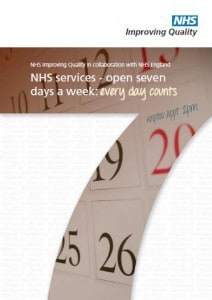I hope y'all had a nice Memorial Day weekend here in the U.S. It's a global audience for the blog, but I had the take the day off from Lean (other than this post for the holiday).
I spent a lot of time over the weekend being lazy and resting as many people do – but for medical reasons, in my case. I threw out my lower back on Friday morning. Allow me to warn you about the workplace safety threat that is the sneeze. I was seated and turned to sneeze…. ouch, my back. By Friday afternoon, I was really hobbling around with a lot of pain shooting down my left leg, muscle twitches and spasms… it was pretty bad. So what to do?
It's not just an American problem, but our healthcare options are limited over a holiday weekend.

In England, they are working on a “7-day NHS” initiative to provide the same level of care seven days a week. It will be interesting to see if that can be adopted and if it can work (and if they can afford it).
Here, by Sunday, I was in even more pain and was pretty bedridden. So, I had my wife drive me to a local urgent care clinic. I didn't think my condition merited a full-blown hospital emergency department visit.
The urgent care clinic was a surprisingly good experience… in and out within 30 minutes (and it would have been less time if it didn't take me so long to hobble back to the exam room and out again).
The physician prescribed some pain meds and a steroid pack to help reduce inflammation in what he suspected is a disc pressing on a nerve in my back. But, that can't be confirmed without an MRI… which you can't really get over the weekend. Could I have gotten that at the hospital? Is it even medically necessary if this gets better within a few days?
It's hard to define “value” in healthcare sometimes — what am I willing to pay for (pain meds!!) and what's medically necessary and helpful? Now that I think about it, my wife's employer has a medical help line. Maybe I should have called them and asked if I should have gone to urgent care or the E.D. But, I guessed the urgent care physician would send me to the hospital if he thought I needed immediate diagnostic work.
As I type this on Monday, I'm feeling a bit better. Instead of dragging my left leg around, I'm walking a bit better. And I'm not too loopy from pain meds (unless this is full of typos I don't see).
Needless to say, I didn't get to grill out or cook over the weekend as I would have normally loved to do.
My Post on Lean in the Kitchen
KaiNexus didn't take a day off from posting blog content yesterday… and they posted something I wrote about Lean and “waste” in the home kitchen. Click the post title or image to read more:

Let me know what you think about the kitchen post by commenting there or here.
What do you think about the need for 7-day healthcare? How many American primary care physicians or clinics have Saturday hours? What can we do to help hospitals provide the same level of care and safety 24×7?
Please scroll down (or click) to post a comment. Connect with me on LinkedIn.
Let’s build a culture of continuous improvement and psychological safety—together. If you're a leader aiming for lasting change (not just more projects), I help organizations:
- Engage people at all levels in sustainable improvement
- Shift from fear of mistakes to learning from them
- Apply Lean thinking in practical, people-centered ways
Interested in coaching or a keynote talk? Let’s talk.
Join me for a Lean Healthcare Accelerator Trip to Japan! Learn More










7 day health care would be great from the patient’s perspective… Care available when needed, on demand.
Our current 5 day system is a form of batching, we effectively cram 7 days worth of ailments into M-F, for the convenience of providers. Consider how nearly every ED has volumes 10-20% higher on Mondays (compared to other days) and one of the likely contributing factors: patient was sick over weekend and unable to get care, now symptoms are worse.
I think urgent cares are so successful because they are providing the appropriate level of care, at the time patients need it. You’re right, you didn’t need an MRI out of the gate… Diagnostic (over) utilization is a whole different waste that I’m sure many are passionate about.
tw
Yes, over-utilization is a problem in terms of adding cost without really adding value… but it’s often a judgment call, eh?
If you didn’t see my post about an article by Dr. Atul Gawande on over-utilization and waste, check it out.
There are organizations, like Intel, that have figured out how to have even staffing 24×7 using different rotating shift patterns, etc. It’s in their business interests to have the same process, the same quality, etc. 24×7. But, Intel employees are just that… employees and the company can tell them when to work.
Physicians have a lot of autonomy whether they are employees are not… you’d have to hope some are willing to work evenings or weekends for primary care.
In hospitals, patients are usually sleeping at night and there’s not the need for completely even staffing 24×7 (at an Intel fab, the wafers and lots never sleep). You need lower staffing levels at night in a hospital, which makes sense. But, there are many studies that show quality suffers if you’re admitted on Friday or over the weekend. Hospitals need to figure out how to provide consistent care on Saturdays and Sundays.
It’s a tough situation – people chose to work in a caring profession… humans don’t get sick or injured on a convenient schedule.
I’m curious if Veterinarians offer better night and weekend hours than human medicine does. Different competitive dynamics at play?
Comments are closed.